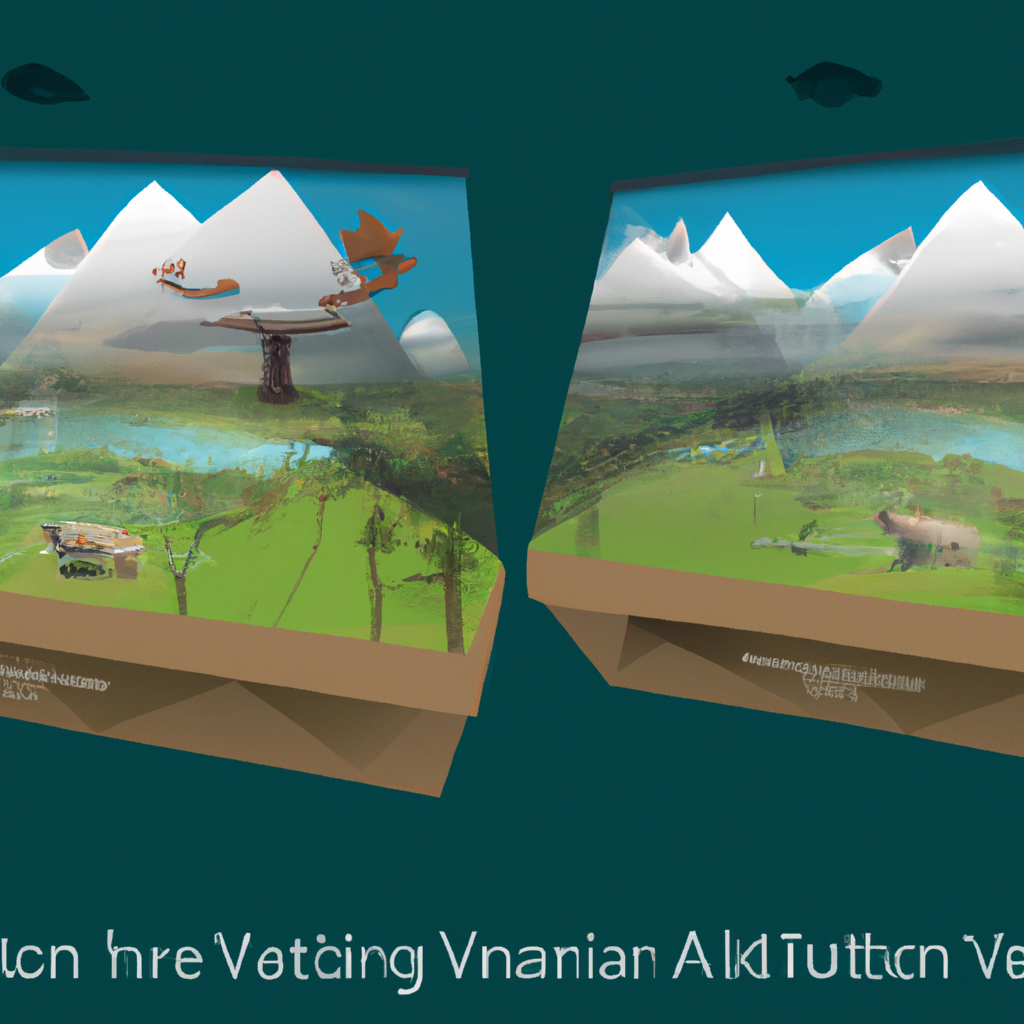작성자 정보
- dml0211 작성
- 작성일
컨텐츠 정보
- 2,469 조회
- 목록
본문

가상현실(VR) 기술은 다양한 산업에서 큰 파장을 일으키고 있으며, 환경 분야도 예외가 아니다. 보존 노력과 연구에 VR을 사용하는 것은 환경에 참여하고 그 복잡성을 이해하는 새롭고 혁신적인 방법을 제공하기 때문에 점점 더 인기를 얻고 있습니다. 본 기사에서는 가상현실이 환경산업에 미치는 영향을 살펴보고, 보존 노력과 연구를 어떻게 강화하고 있는지를 중점적으로 살펴볼 것입니다.
가상현실(VR) 기술이 활용되고 있는 핵심 방식 중 하나는 다양한 산업 분야에서 파장을 일으키고 있으며 환경 분야도 예외가 아니다. 보존 노력과 연구에 VR을 사용하는 것은 환경에 참여하고 그 복잡성을 이해하는 새롭고 혁신적인 방법을 제공하기 때문에 점점 더 인기를 얻고 있습니다. 본 기사에서는 가상현실이 환경산업에 미치는 영향을 살펴보고, 보존 노력과 연구를 어떻게 강화하고 있는지를 중점적으로 살펴볼 것입니다.
VR이 환경 산업에서 사용되는 주요 방법 중 하나는 환경 문제에 대한 교육 및 인식 제고입니다. VR은 사용자들이 전통적인 미디어로는 불가능한 방식으로 가상 환경을 경험하고 상호 작용할 수 있게 해줍니다. 예를 들어, VR은 기후 변화가 특정 생태계에 미치는 영향을 시뮬레이션하는 데 사용될 수 있으며, 사람들이 그들의 행동의 영향과 보존 노력의 중요성을 이해할 수 있도록 합니다. 이러한 유형의 몰입형 경험은 사람들이 환경과 더 깊은 수준으로 연결하고 환경을 보호하는 것의 중요성을 이해할 수 있도록 해주기 때문에 특히 영향을 미칠 수 있습니다.

VR이 환경 산업에서 사용되는 또 다른 방법은 연구 및 데이터 수집을 개선하는 것입니다. 경우에 따라 특정 환경에서 데이터를 수집하는 것이 어렵거나 심지어 위험할 수도 있습니다. 예를 들어, 자연 서식지에서 야생 동물의 행동을 연구하는 것은 어려울 수 있고 심지어 연구원을 위험에 빠뜨릴 수도 있습니다. VR을 통해 연구자들은 실제 생태계를 모방한 가상 환경을 만들고, 안전하고 통제된 환경에서 야생동물의 행동에 대한 데이터를 관찰하고 수집할 수 있습니다. 이것은 멸종 위기에 처한 종들이나 그들의 자연 서식지에서 관찰하기 어려운 종들을 연구하는 데 특히 유용할 수 있습니다.
한국과 관련된 사례는 습지 보호에 VR을 사용하는 것입니다. 국립공원관리공단은 습지의 중요성과 인간의 활동이 생태계에 미치는 영향에 대해 대중에게 교육하기 위해 VR을 사용해 왔습니다. VR 체험은 사용자들이 가상 습지를 탐험하고, 그곳에 사는 다양한 종들에 대해 배우고, 오염과 서식지 파괴와 같은 인간 활동의 영향을 이해할 수 있게 해줍니다. VR 체험은 대중들에게 좋은 반응을 얻었고 습지의 중요성과 습지 보호의 필요성에 대한 인식을 높이는 데 도움이 되었습니다.
결론적으로, 가상 현실 기술은 환경 산업에 상당한 영향을 미치고 있으며, 보존 노력 및 연구에 사용되는 것이 점점 더 대중화되고 있습니다. VR은 환경에 참여하고 그 복잡성을 이해하는 새롭고 혁신적인 방법을 제공하며 교육, 인식 제고 및 연구를 위한 효과적인 도구로 입증되고 있습니다. VR 기술이 계속 발전함에 따라, 환경 산업에서 VR 기술의 사용은 계속해서 증가할 것이며, 우리 행성의 생태계를 보호하고 보존하는 데 점점 더 중요한 역할을 할 것입니다.

환경 산업에서 VR 기술의 가장 흥미로운 측면 중 하나는 사람들을 하나로 모으고 협업을 촉진할 수 있는 잠재력입니다. 세계의 다른 지역에서 온 사람들이 함께 일하고 정보를 공유할 수 있는 가상 환경을 만들어냄으로써, VR은 보존 노력이 수행되는 방식을 변화시킬 수 있는 잠재력을 가지고 있습니다. 예를 들어, 과학자와 환경 보호론자는 VR을 사용하여 연구 프로젝트에서 협업하고 물리적 위치에 상관없이 실시간으로 데이터를 공유할 수 있습니다. 이를 통해 보다 효율적이고 효과적인 보존 노력을 할 수 있을 뿐만 아니라 환경과 환경의 복잡성에 대한 이해를 높일 수 있습니다.
환경 산업에서 VR 기술의 또 다른 장점은 보존 노력의 비용을 줄이는 데 도움이 될 수 있다는 것입니다. 연구원과 환경 보호론자는 가상 환경을 조성함으로써 현장 작업과 여행의 필요성을 줄여 시간과 비용을 절약할 수 있습니다. 또한 VR을 사용하여 다양한 보존 전략의 영향을 시뮬레이션할 수 있으므로 의사 결정자는 어떤 전략이 가장 효과적인지에 대한 정보에 입각한 결정을 내릴 수 있습니다.
결론적으로, 가상 현실 기술은 환경 산업에 상당한 영향을 미치고 있으며, 환경에 참여하고, 인식을 높이고, 보존 노력을 개선할 수 있는 새롭고 혁신적인 방법을 제공하고 있습니다. 교육, 연구 또는 협업에 사용되든 VR은 우리가 지구 생태계를 이해하고 보호하는 방식을 변화시킬 수 있는 잠재력을 가지고 있습니다.
VR 기술이 계속 발전함에 따라, 환경 산업에서 VR 기술의 사용은 계속해서 증가할 것이며, 미래 세대를 위해 지구를 보존하고 보호하는 데 점점 더 중요한 역할을 할 것입니다.
요약:.
가상 현실 기술은 환경에 참여하고, 인식을 높이고, 보존 노력을 개선하기 위한 새롭고 혁신적인 방법을 제공함으로써 환경 산업을 변화시키고 있습니다. 그것은 교육, 연구 및 협력을 위해 사용되고 있으며, 보존 노력의 비용을 줄이고 사람들이 공동의 목표를 향해 함께 일하게 할 수 있는 잠재력을 가지고 있습니다. VR 기술이 계속해서 발전함에 따라, 그것은 환경 산업에서 점점 더 중요한 역할을 하고 미래 세대를 위해 지구의 생태계를 보호하고 보존하는 데 도움이 될 것입니다.
Virtual reality (VR) technology has been making waves in various industries, and the environmental sector is no exception. The use of VR in conservation efforts and research is becoming increasingly popular, as it offers a new and innovative way to engage with the environment and understand its complexities. In this article, we will explore the impact of virtual reality on the environmental industry, with a focus on how it is enhancing conservation efforts and research.
One of the key ways VR is being used in the environmental industry is to educate and raise awareness about environmental issues. VR allows users to experience and interact with virtual environments in a way that is not possible with traditional media. For example, VR can be used to simulate the effects of climate change on a specific ecosystem, allowing people to understand the impact of their actions and the importance of conservation efforts. This type of immersive experience can be especially impactful, as it allows people to connect with the environment on a deeper level and understand the importance of protecting it.
Another way VR is being used in the environmental industry is to improve research and data collection. In some cases, collecting data in certain environments can be difficult or even dangerous. For example, studying the behavior of wildlife in their natural habitats can be challenging and may even put the researcher at risk. With VR, researchers can create virtual environments that mimic real-world ecosystems, and observe and collect data on the behavior of wildlife in a safe and controlled environment. This can be especially useful for studying endangered species or those that are difficult to observe in their natural habitats.
A case related to Korea is the use of VR in the conservation of wetlands. The Korea National Park Service has been using VR to educate the public about the importance of wetlands and the impact of human activities on these ecosystems. The VR experience allows users to explore a virtual wetland, learn about the different species that live there, and understand the impact of human activities such as pollution and habitat destruction. The VR experience has been well received by the public and has helped to raise awareness about the importance of wetlands and the need to protect them.
In conclusion, virtual reality technology is having a significant impact on the environmental industry, and its use in conservation efforts and research is becoming increasingly popular. VR offers a new and innovative way to engage with the environment and understand its complexities, and is proving to be an effective tool for education, awareness-raising, and research. As VR technology continues to evolve, it is likely that its use in the environmental industry will continue to grow, and it will play an increasingly important role in helping to protect and conserve our planet's ecosystems.
One of the most exciting aspects of VR technology in the environmental industry is its potential to bring people together and foster collaboration. By creating virtual environments that allow people from different parts of the world to work together and share information, VR has the potential to transform the way conservation efforts are carried out. For example, scientists and conservationists can use VR to collaborate on research projects and share data in real-time, regardless of their physical location. This can lead to more efficient and effective conservation efforts, as well as a greater understanding of the environment and its complexities.
Another advantage of VR technology in the environmental industry is that it can help to reduce the cost of conservation efforts. By creating virtual environments, researchers and conservationists can reduce the need for field work and travel, saving time and money. Additionally, VR can be used to simulate the impact of different conservation strategies, allowing decision-makers to make informed decisions about which strategies are likely to be most effective.
In conclusion, virtual reality technology is having a significant impact on the environmental industry, offering new and innovative ways to engage with the environment, raise awareness, and improve conservation efforts. Whether it is used for education, research, or collaboration, VR has the potential to transform the way we understand and protect our planet's ecosystems. As VR technology continues to evolve, it is likely that its use in the environmental industry will continue to grow, and it will play an increasingly important role in helping to conserve and protect our planet for future generations.
Summary:
Virtual reality technology is transforming the environmental industry by offering new and innovative ways to engage with the environment, raise awareness, and improve conservation efforts. It is being used for education, research, and collaboration, and has the potential to reduce the cost of conservation efforts and bring people together to work towards a common goal. As VR technology continues to evolve, it is likely to play an increasingly important role in the environmental industry and help protect and conserve our planet's ecosystems for future generations.







